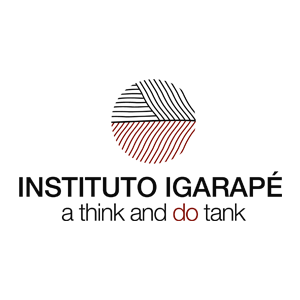Press Release: Technology Solutions for Supply Chain Traceability in the Brazilian Amazon: Opportunities for the Financial Sector
The 2019 Amazon fires brought unprecedented attention to the issue of deforestation in Brazil, which is currently at its worst levels since 2007. The Amazon is nearing its critical ‘tipping point’, beyond which both the Amazon biome and our global climate will suffer irreversible damages, negatively impacting not only local communities but also entire industries. The most affected regions will be Amazon and Cerrado that depend on natural capital and represent a significant portion of Brazilian GDP. In this paper, the Igarape Institute reviews challenges and opportunities around illegal deforestation and recommends three measures that, when adopted by financial institutions, will have a rapid, effective, and large-scale impact on limiting illegal deforestation in the Brazilian Amazon.
The widespread international reaction to the 2019 fires underlined the urgency for companies and investors to manage reputational, operational, legal, and regulatory risks posed by natural capital degradation in commodity supply chains. Institutions such as the World Economic Forum (WEF), Trucost (now part of S&P Global), UNEP Finance Initiative and UN Global Compact, the Carbon Disclosure Project, the Tropical Forest Alliance; the Intergovernmental Panel on Climate Change (IPCC) have placed the Amazon at the heart of global climate risks. Already in response to last year’s fires, 251 global investors with $17.7 trillion in assets have demanded that companies meet their commodity supply chain deforestation commitments or risk losing access to international markets.
This paper reviews current practices in standards and benchmarking for soy farming, cattle ranching, and timber. While the financial sector has begun the process of adopting policies that address deforestation risks, few institutions make these policies mandatory to loan-agreements or actively monitor them. Nonetheless, initiatives are underway that are guiding financial institutions as they incorporate natural capital considerations into their products and services. In 2016, a dozen banks with a combined US$10 trillion in assets committed to the Soft Commodities Compact, which aims to achieve greater supply chain transparency in the financial sector. More recently, the Accountability Framework and the World Economic Forum IBC ESG metrics aim offer a core set of global metrics for non-financial reporting, building on indicators from the Global Reporting Initiative (GRI) and Carbon Disclosure Project (CDP).
The paper also highlights several of the key technologies underpinning the greater degree of supply chain traceability needed to measure progress on ESG metrics. The Soft Commodities Compact, for example, prohibits signatories from providing financial services to companies that illegally deforest, yet offers no way to measure this objectively. Remote sensing, big data, and artificial intelligence now offer unprecedented ability to track environmental impacts for specific properties, licenses, and concessions. For example, Global Forest Watch, MapBiomas and the Terras app allow users to track land use change at the farm level in order to track zero-deforestation commitments and inform rural credit decisions. Similarly, the Trase platform allows users to assess the exposure of different companies in high-risk sectors based on the municipalities in which their suppliers operate.
Such tools already allow the financial sector to leverage data and emerging technologies to transform the way that companies measure, monitor, and manage their deforestation and land use exposure, thereby improving transparency, reliability of credit risk analyses, and integration with existing reporting standards. Three measures can be adopted by financial sector in order to have an immediate impact:
(1) advocating for greater market transparency through a public and audited Rural Environmental Registry (CAR) and a public (Animal Transit Guide) GTA;
(2) conditioning credit approval on robust land registry information, including CAR, Brazilian Bovine and Bubaline Identification and Certification System (SISBOV) GTA information triangulated and verified by satellite data; and
(3) integrating deforestation and land-use indicators into existing ESG metrics to more accurately measure physical and transitional risks throughout companies’ supply chains.
Adoption of these priorities will significantly improve the transparency of supply chains, raise credit approval standards, and bolster financial institutions’ capacity to de-risk portfolios in climate-vulnerable sectors. From an environmental standpoint, these three priorities have the potential to drive transparency and thereby hold public and private actors more accountable in terms of supply chain impacts on natural capital, while reducing the frequency and scale of financing of irregular projects. The financial sector is thus uniquely positioned to shape the agenda and drive the change needed in order to avoid irreversible damages to both the Amazon biome and our global climate.
The essay is available at: https://igarape.org.br/en/technology-solutions-for-supply-chain-traceability-in-the-brazilian-amazon-opportunities-for-the-financial-sector/
For interviews with the authors, contact: Elayne Cirne <elayne@igarape.org.br>
About the Igarape Institute
Igarape Institute is an independent think and tank, dedicated to integrating security, development and climate agendas. The Institute’s goal is to propose data-driven solutions and partnerships to global challenges through research, new technologies, and strategic communication. The Institute is currently leading a major project to map environment crime in the Amazon Basin in partnership with Interpol, UNODC and InSight Crime. The Institute is a nonprofit, independent and non-partisan institution, headquartered in Rio de Janeiro, with activities in Brazil and across Latin America and Africa. The Institute was ranked the world’s best social policy think tank in 2019 by the Prospect Magazine and listed as among the top 100 Brazilian NGOs since 2018.



